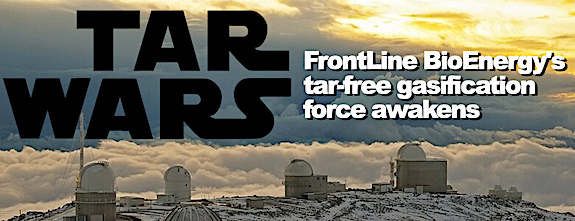Tar Wars: FrontLine BioEnergy’s tar-free gasification force awakens

What happens in Vegas, stays in Vegas, but what happens in Nevada occasionally rocks the world. Nevada, Iowa, that is. Sure enough, news arrives from Nevada that Frontline BioEnergy announced has achieved a breakthrough in syngas quality for biomass gasification at its new pilot facility located in Nevada, Iowa. Nevada is, if you will, to the bioeconomy as Jakku is to Star Wars: everyone describes it as a neglected outpost, but important stuff keeps happening there.
Briefly, let’s review the problem which this breakthrough addresses, which is our friend tar.
Tar’s Toxic Tale
Skip this next sentence if you’re well-versed in the field, read on if the bioeconomy is newer to you: when we heat up biomass under controlled conditions, we can transform it into a soup of carbon monoxide and hydrogen, called syngas, which can then be converted into fuels, plastics, specialty chemicals, fertilizers, lots and lots of useful stuff. Biomass gasification uses organic material, from corn stover to wood waste — not the only thermochemical tech, for there is pyrolysis, hydrothermal liquefaction out there, to name a couple. But it’s key to the Fischer-Tropsch process, and others.
Gasification of biomass was discovered more than 400 years ago, but syngas from gasified biomass contains numerous hydrocarbons, also called tars, which are detrimental to process equipment and can be hazardous to human health. If you remember that certain cigarettes were promoted as “low-tar”, you’ll get the idea.
Although research has tested a wide variety of methods from filters to absorbers to exotic systems involving plasma, a practical solution to managing these tars has remained elusive.
So, why a big deal for the advanced bioeconomy?
Syngas, some have hoped, is a kind of universal substrate that could be the basis of a transformative economy-wide shift from petroleum and natural gas — when the DOE Billion-Ton Study references a billion tons of biomass available in the US for under $100 per ton, gasification is a necessary technology to unlock those kinds of volumes.
Gasification opens up a host of recalcitrant feedstocks which do not yield to fermentation’s deconstructive charms. And, it bypasses the lignin problem, because the pesky and unruly village of phenolic compounds disappears into, as it were, the cloud.
So, if you’ve followed the fortunes of Enerkem, or Fulcrum BioEnergy, to name two companies of high profile, you’ve been following gasification. Frontline has long-been engaged on a quest to eliminate these process-inhibiting tars and take gasification to the next level. That day may well have just arrived.
Frontline’s force awakens
The innovative technology, called TarFreeGas, has achieved the ultimate goal of biomass gasification: ultra-clean biomass-derived synthesis gas.
The Frontline backstory
Since 2005, Frontline BioEnergy has been at the forefront of designing proprietary equipment for biomass gasification, including gasification and gas cleaning technology that provides practical, cost-effective, efficient, and reliable renewable energy solutions.
Reaction from the stakeholders
“My thought was, we did it. We were thrilled when our results began to show non-detectable levels of all tars leaving the catalytic gas converter,” said Dr. T. J. Paskach, Frontline’s Chief Technology Officer. “We insisted that our solution be economic, scalable, reliable, and practical, and we wouldn’t settle for anything less than meeting each and every goal. It has required a lot of resources and effort over the last 15-plus years, but we did it. This technology has the potential to revolutionize the energy industry.”
“Our TarFreeGas technology makes synthesis gas without harmful tars, and that promises to unlock the absolutely huge potential in the biomass conversion sector,” said Dr. Paskach.
Dr. Paskach also shared his vision for the technology’s potential. “Up until now, that stored energy has been lost to decomposition. Now we have a practical and super-clean way to convert that wasted potential into renewable fuels and chemicals. The U.S. creates more than one billion tons of biomass annually that could be converted through our TarFreeGas® process. That’s enough energy to replace 50% of our country’s natural gas usage.”
The Bottom Line
Not quite sure the War on Tar is won, and after winning the war, we’ll still have to win the peace. But a major battle? Yes, it’s been fought and though the smoke is still clearing from the battlefield, it looks as if the good guys have emerged victorious. May the Force Be With You.
More on the story
Learn more about Frontline by visiting frontlinebioenergy.com.
Category: Top Stories















